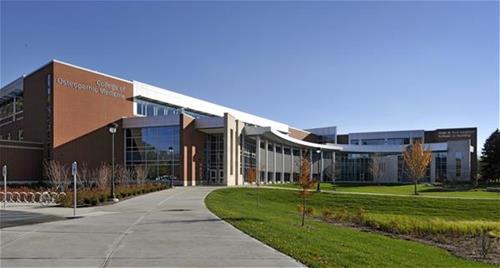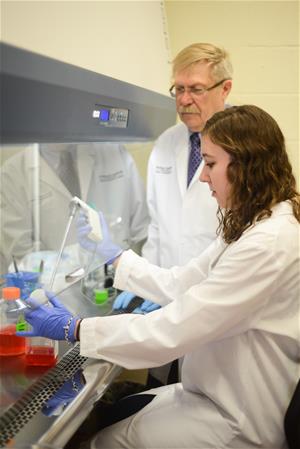On Marian University's Indianapolis campus, the Leighton School of Nursing (LSON) shares facilities with the Tom and Julie Wood College of Osteopathic Medicine (MU-WCOM) in the Michael A. Evans Center for Health Sciences.
The center features high-tech classrooms and simulation labs where state-of-the-art technology enhances our experiential teaching and learning through video lecture capture, audience response, web-based courses, distance learning, and podcasting.
The faculty of LSON and MU-WCOM collaborate to provide you with exceptional inter-professional educational opportunities. You'll complete coursework, labs, and clinical experiences intentionally designed to build cooperation, communication, teamwork, and related skills that are critical for high-quality patient care and outcomes in a fast-paced healthcare environment.
When you graduate, you'll have the knowledge, experience, and leadership skills to make a difference in the quality of life in your community.

Located on the Marian University campus, the Michael A. Evans Center for Health Sciences spans over 140,000 square feet, and houses classrooms, two large lecture halls, a chapel, office spaces, skills labs, mock clinic exam rooms, and simulation, manipulation, anesthesia, biochemistry, and anatomy laboratories across its four-story structure.
The building brings a modern flare to MU’s traditional architecture while creating a strong new visual presence. Our university’s strong Catholic values are portrayed through various visual displays, including the spiritual three-story stained glass “lantern” which anchors the corner of campus to the community. Other art installations include a two-story gleaming white relief mural of St. Francis with lepers, a macro-view of the double helix in the floor tiles from one end of the building to the other, and ceramic art panels depicting the four Franciscan Values.
The Evans Center facility was honored at the 2014 Indianapolis Monumental Awards for Merit in Architecture.
Designed by the Indianapolis-based architectural firms Schmidt Associates and BSA LifeStructures, the building adheres to the LEED Gold standards, a globally acknowledged green building certification system formulated by the U.S. Green Building Council.
Sustainable Features Include:
Additionally, the demolition of pre-existing structures on the site was carried out to maximize the recovery and recycling of materials, including chapel furnishings made from trees harvested on-site.
Encompassing ten examination rooms, four simulation labs with adjoining debriefing rooms, and dual control rooms, the Hill-Rom Simulation Center is a hub for immersive, risk-free clinical training.
Nursing and medical students engage in early clinical education, sharpening their patient care and clinical skills within realistic settings. The center utilizes a mix of standardized patients, human patient simulations, and computerized scenarios with high-fidelity adult and child mannequins to ensure a comprehensive training experience.
As healthcare professionals, there may always be unforeseen circumstances, no matter how prepared students are to enter the field. We emphasize foundational training to equip our students with the ability to adeptly manage such unforeseen challenges. Our program places a strong emphasis on the humanistic aspects of nursing education—nurturing kind, compassionate communicators who excel in patient interaction.
The simulation center is designed to provide space, equipment, resources, and a team that can safely simulate learning experiences common to hospital and clinical settings. Cameras are recording the space for students and faculty to review and analyze performances.
This immersive environment allows students to practice handling patient interactions and clinical situations well before clinical rotations begin. Students will participate in Objective Structured Clinical Examinations (OSCEs) with standardized patients (actors) for further practical experience.
Doctoral students in our Certified Registered Nurse Anesthetist track take full advantage of our brand-new, 1,750 sq. ft. state-of-the-art Nurse Anesthesia Lab featuring three operating rooms.
 Research Labs
Research LabsNursing and medical students at Marian University have ample opportunities to gain research experience, working alongside expert faculty mentors and presenting their findings at on- and off-campus research symposia and professional events.
Our laboratory facilities enable you to explore state-of-the-art research techniques in cell and molecular biology, microbiology, immunology, and physiology. In addition to the technology located in the Evans Center, you can utilize additional lab and research equipment in Clare Hall, where high-performance liquid chromatography, mass spectroscopy, and nuclear magnetic resonance spectroscopy facilities are available.
Among the key equipment in our research facilities are a four-color flow cytometer, fluorescence microscope, electroporator, gel imager, microplate reader, UV spectrophotometer, multi-channel NanoDrop device, gradient and quantitative thermocyclers, and a full array of other basic bio-laboratory equipment. Equipment for applied physiology research and osteopathic manipulative medical research is located in the Evans Center.
Our online ABSN programs in Indianapolis and Nashville operate at satellite locations. These ABSN learning sites are where you'll complete your skills and simulation lab work and take proctored exams. For information, explore our online ABSN program.
Nursing and medical students at Marian University have access to an online medical library that includes 1,000 biomedical journals, hundreds of e-books, and dozens of specialty databases. A medical librarian is available to help you find what you need. The university's main library includes hard-copy and digital journals and biomedical publications.